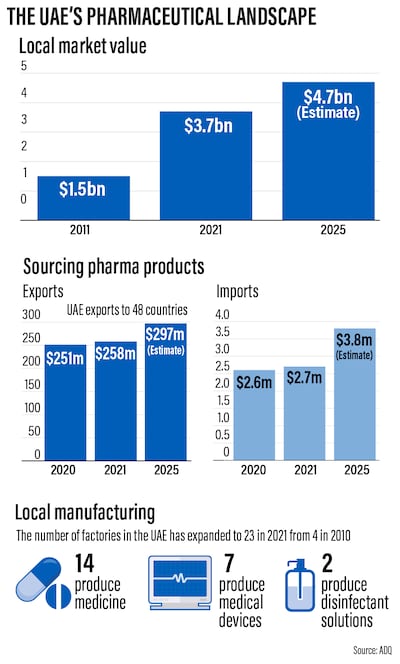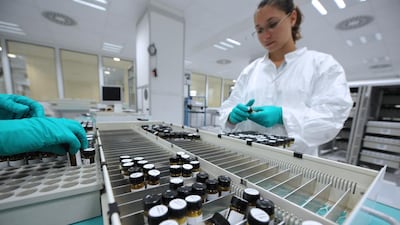The UAE's pharmaceutical market is expected to grow by 27 per cent between 2021 and 2025, as the country pushes to become a regional pharmaceutical centre, Abu Dhabi holding company ADQ said in a report.
The size of the local pharmaceutical market is expected to hit $4.7 billion in value by 2025, up three times from 2011, the ADQ FWD white paper paper titled Redefining Regional Pharma found.
The number of manufacturing units in the UAE reached 23 in 2021, up from four in 2010, with 14 producing medicines, four manufacturing medical devices and two focused on disinfectant solutions. There are now more than 2,500 medicines produced locally.
The paper was created to “examine key opportunities and investments for enhancing regional pharmaceutical capacity to ensure access to affordable, quality medication while advancing innovative treatments”, said Jaap Kalkman, group chief investment officer at ADQ.
The UAE, which imports about 80 per cent of its pharmaceutical products, has been investing heavily in boosting its local manufacturing capabilities to reduce costs and ensure steady supplies.
It also plans to grow its pharmaceutical export market to about $297 million by 2025, up 15 per cent from 2021.
Last year, the Emirates became the first country regionally to set up a coronavirus vaccine factory after a phase three clinical trial of the inactivated Covid-19 vaccine.
The joint venture between Sinopharm and G42 Healthcare aims to produce up to 200 million Hayat-Vax doses annually at a factory in the Kizad Life Sciences Park.
In December, Abu Dhabi’s Mubadala Investment Company also joined forces with Group 42 to set up a biopharmaceutical manufacturing campus in the UAE capital.
The campus will tap into global vaccine and therapeutic products to strengthen regional supply chains and drive the country's diversification and economic growth agenda, the organisations said.
Currently, 11 pharmaceutical multinationals operate in the UAE, including Johnson & Johnson, AstraZeneca, Novartis, Roche, Pfizer, GSK and Sanofi.
“From building public-private partnerships, incentivising pharmaceutical companies and opening up market access for innovative and novel medicines, we are realising the UAE’s vision to be a leading pharmaceutical hub for the region and beyond,” Dr Amin Hussain Al Amiri, assistant undersecretary of the health regulations sector at the Ministry of Health and Prevention, was quoted as saying in the paper.
The ministry also intends to continue its initiative to reduce medicine prices until drug prices in the country become “the lowest in the GCC”, the paper said.
The UAE has put in place generic drug substitution policies since 2018 and currently has more than 6,000 generic medicines that cost about 60 per cent less than their branded counterparts.
Generic drug sales in the UAE stood at Dh2.5bn in 2020, representing 19 per cent of the total pharmaceutical market.
“The main barrier to the uptake of generic medicines is patients preferring well-known brands. To expand the local pharmaceutical industry, we need the public to understand more about high-quality alternatives,” Dr Ali Hussain, director of the pharmacy department at the Dubai Health Department, said in the paper.

The report suggested six ways to boost the UAE's pharmaceutical sector's growth including: driving collaboration among stakeholders, establishing a robust life sciences research and development ecosystem, developing UAE-based biotechnology and life sciences parks, increasing the UAE’s manufacturing capabilities, adopting cutting-edge technology and growing a highly skilled talent pool.
“We are deploying capital to build a pharma hub that further strengthens the UAE’s regional leadership in the industry. As we invest in expanding capabilities, deepening the talent pool and increasing manufacturing drugs locally, we are helping to redefine the regional pharma landscape,” said Fahad Al Qassim, executive director of health care and life sciences at ADQ.


